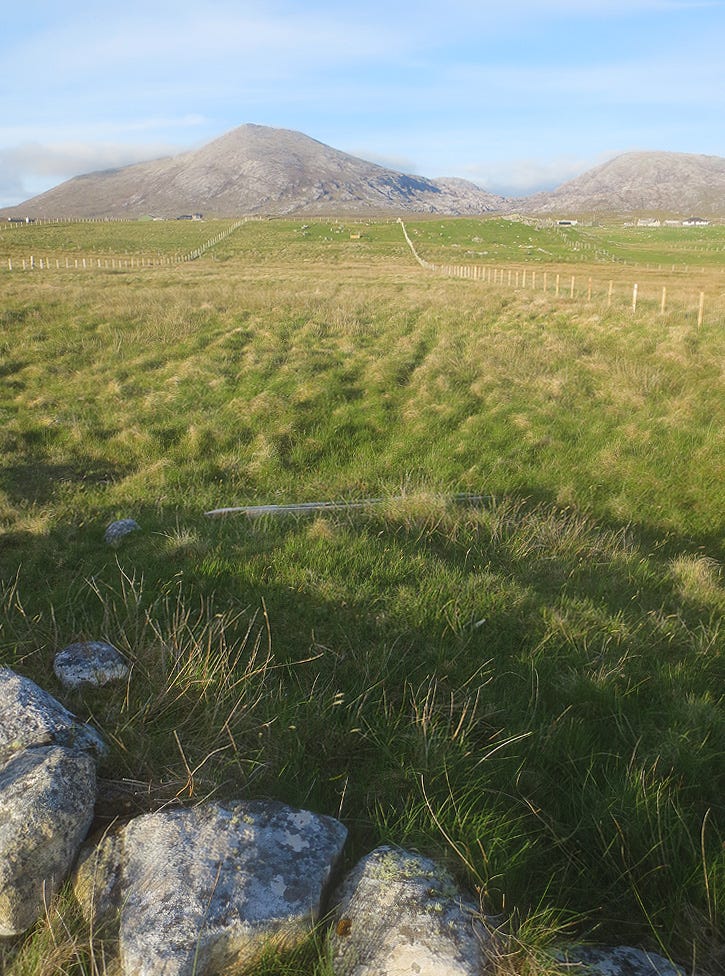‘Riverwitch’ is a collaborative project with my husband David Knowles, author of Elvers by Moonlight. It’s the re-membering of a blog duet we began in 2014, mapping our dislocation from the Isle of Lewis in the Outer Hebrides to Donegal in north-west Ireland. It offers a story-within-a-story as, ten years on, we try to make sense of the ways in which places claim us, mark us – and then, when it’s time, cast us loose. We take turns every Wednesday to revisit an old post and add new reflections and insights. If you’re new here, for the background to this project, please read this post first.
This post was a response to David’s ‘The Field’, which he posted last week. Read it here.
The audio of my posts is for paid subscribers, below the paywall.
The Field (Reprise)
January 2014
This was the breaking field. Wrist-breaker, back-breaker, heart-breaker, circuit-breaker. One weathered strainer too many, one too many ‘boulders larger than one man can handle’. You handled them anyway. This is the haunted field: the wide-shouldered, hard-edged ghost of Bull McCabe patrols its pale in the midnight shimmer of this January Wolf Moon.
This field, this enigma. This field that riddles us. Did we require too much of the field, or did it require too much of us? For sure I was not equal to that field – or is it that it was not equal to me? How do you face such a field, with all its hard history? How do you not reflect its barrenness, in your turn? Does this field require my blood? – I am not ready to give it. Can you take blood from a stone? I take from this field more questions than answers. Each question a stone; each stone my answer. You, the stones, the questions and all the too-, too-hard answers.
This is the field where the dreams were buried. They rise up now through its sodden soil like Persephone’s clenched fist, punching through from the Underworld where the dreams lie buried. Out the dreams flow, down along the ditch you dug by hand, picking up pace until, released, they race onto the open headland and spill their life’s blood out into the sea.
Memories of the field
September 2024
Those were the hardest days: the first grey, ghostly days of the new year which dawned on a field of old dreams turned now to stone. The days when the leaving to come first felt real, when we too became grey ghosts in a land we no longer belonged to. It felt, to me, like an abandonment. Well, if we weren’t equal to that field, we certainly weren’t equal to that hard, bleak, breathtakingly beautiful land. For a long time, though, I thought I was. The years in which I rooted myself in it; the years in which I became it. Sometimes, a land just claims you, sets about making you its own. Adopts you, teaches you, nourishes you, creates you. And sometimes, after a while, it spits you out.
In the old stories, the women merge into the land; in the old stories, the men strive always to measure themselves against it. And coming up short, as they always will, they fight it. Who knows what they think they’re fighting, or why. But it seems to be what they do.
Fifteen years before we landed on Lewis, I lived just down the road from the Connemara village in which the film version of John B Keane’s play The Field had recently been shot. A mesmerising Richard Harris as powerful old Bull McCabe, master of his fine green field. Or was his field the master of him? The field that he’d spent five long years improving. Remaking it in his own imagined image. Five years of him in that field: years of blood, of sweat, of aching back and bruised and battered hands. Every stone in it dug out by hand. Seaweed carried up from the shore to make it fertile. Lime spread to neutralise its acid. Not a single rush was permitted and oh, it was a fine green field indeed. But it did for him in the end, that field. His obsession did for him, in the end. The Bull conquered the field, but it conquered him, in the end.
In the end.
In the end, I wanted no more fields. I’d been a crofter then for more than eleven years, four of them alone. I wanted now to be free of fields; I wanted to be free of stone. I longed only for the bright, bubbling laughter of a river that ran through a land in which I had no stake. On which I could sit lightly, and learn – somehow – to dream again.





